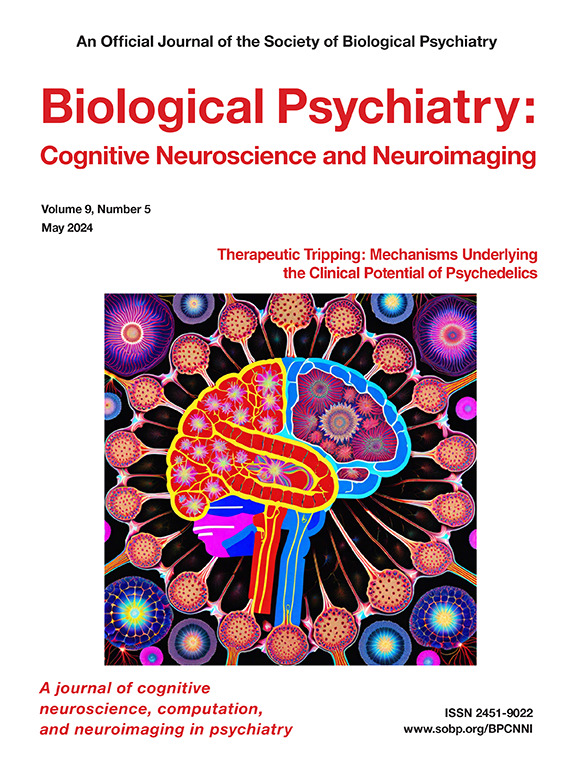The Reward Positivity Mediates the Association Between Adverse Childhood Experiences and Anhedonia in Young Adults With Drug-Naïve Major Depressive Disorder
IF 5.7
2区 医学
Q1 NEUROSCIENCES
Biological Psychiatry-Cognitive Neuroscience and Neuroimaging
Pub Date : 2025-01-01
DOI:10.1016/j.bpsc.2024.08.014
引用次数: 0
Abstract
Background
Current clinical studies have indicated that major depressive disorder (MDD) concurrent with adverse childhood experiences (ACEs) is associated with greater anhedonia. However, little is known about whether the change in reward sensitivity among young individuals with MDD and ACEs is related to anhedonia.
Methods
We evaluated anhedonia and ACEs in 86 patients with MDD (31 with no or 1 ACE and 55 with 2 or more ACEs) and 44 healthy control participants. Then, participants completed the Iowa Gambling Task during electroencephalography to measure the reward positivity (RewP) and its difference (ΔRewP; gains minus losses). Furthermore, we constructed a mediation model to assess whether aberrant ΔRewP mediated the relationship between ACEs and anhedonia.
Results
Compared with healthy control participants and MDD patients with no or 1 ACE, MDD patients with 2 or more ACEs had the most severe symptoms of anhedonia and impaired decision making and showed significantly reduced reward sensitivity (most blunted ΔRewP). More importantly, ΔRewP mediated the relationship between ACEs and anhedonia in MDD.
Conclusions
We found that the ΔRewP partially mediated the association between ACEs and anhedonia in patients with MDD, which provides evidence for the neurobiological basis of abnormal changes in the reward system in MDD individuals with early adverse experiences.
奖赏积极性在患有药物治疗无效重度抑郁症的年轻成人的童年不良经历和失乐症之间起着中介作用。
背景:目前的临床研究表明,具有不良童年经历(ACEs)的重度抑郁障碍(MDD)与更严重的失乐症有关。然而,人们对患有ACE的年轻MDD患者奖赏敏感性的变化是否与失乐症有关知之甚少:方法:我们对每位患者的失乐症和ACE进行了评估。然后,我们在脑电图中执行了爱荷华赌博任务,测量了86名MDD患者(31名无ACE或仅有1名ACE,55名有2名或2名以上ACE)和44名健康对照组(HCs)的奖赏积极性(RewP)及其差异(ΔRewP)。此外,我们还构建了一个中介模型,以评估异常ΔRewP是否能中介ACE与失神之间的关系:结果:与健康对照组和没有或只有一种ACE的MDD患者相比,有两种或两种以上ACE的MDD患者的失神症状最严重,决策能力受损,奖赏敏感性显著降低(ΔRewP最迟钝)。更重要的是,ΔRewP介导了ACE与MDD患者失乐症之间的关系:结论:我们发现ΔRewP在一定程度上介导了ACE与MDD患者失乐症之间的关系,这为具有早期不良经历的MDD患者奖赏系统异常变化的神经生物学基础提供了证据。
本文章由计算机程序翻译,如有差异,请以英文原文为准。
求助全文
约1分钟内获得全文
求助全文
来源期刊

Biological Psychiatry-Cognitive Neuroscience and Neuroimaging
Neuroscience-Biological Psychiatry
CiteScore
10.40
自引率
1.70%
发文量
247
审稿时长
30 days
期刊介绍:
Biological Psychiatry: Cognitive Neuroscience and Neuroimaging is an official journal of the Society for Biological Psychiatry, whose purpose is to promote excellence in scientific research and education in fields that investigate the nature, causes, mechanisms, and treatments of disorders of thought, emotion, or behavior. In accord with this mission, this peer-reviewed, rapid-publication, international journal focuses on studies using the tools and constructs of cognitive neuroscience, including the full range of non-invasive neuroimaging and human extra- and intracranial physiological recording methodologies. It publishes both basic and clinical studies, including those that incorporate genetic data, pharmacological challenges, and computational modeling approaches. The journal publishes novel results of original research which represent an important new lead or significant impact on the field. Reviews and commentaries that focus on topics of current research and interest are also encouraged.
 求助内容:
求助内容: 应助结果提醒方式:
应助结果提醒方式:


